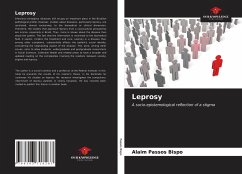Infectious-contagious diseases still occupy an important place in the Brazilian pathological profile. However, studies about diseases, particularly leprosy, are restricted, almost exclusively, to the biomedical or clinical dimension. Therefore, the studies that approach leprosy from a sociocultural perspective are scarce, especially in Brazil. Thus, more is known about the disease than about the patient. The fact that the information is restricted to the biomedical field, it seems, hinders the treatment and cure. Leprosy is a disease that, among other symptoms, substantially affects the patient's social identity, considering the stigmatizing aspect of the disease. This work, among other issues, aims to allow students, undergraduate and postgraduate researchers in Social Sciences, Collective Health and related areas to have a broader and updated reading on the complexities involving the relations between society, stigma and leprosy.
Bitte wählen Sie Ihr Anliegen aus.
Rechnungen
Retourenschein anfordern
Bestellstatus
Storno








